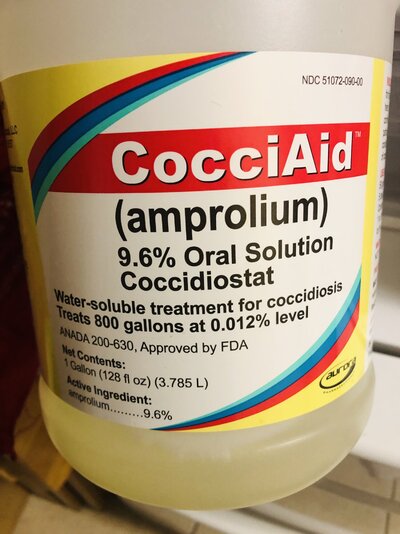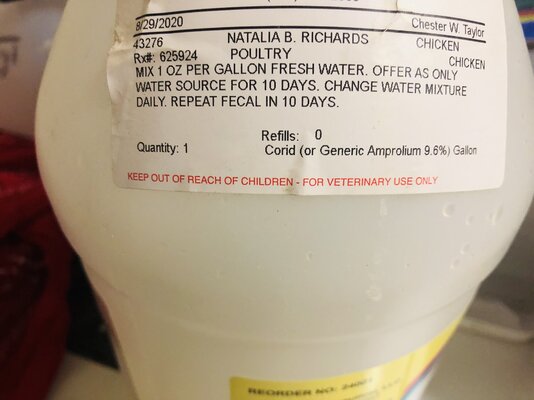Hi everyone. Thank you for your input.
This is the problem.
I have 34 layers including two roosters, one pair of African geese, and I had a pair if turkeys, but now only one. And guinea hen to help keep the flock secured. And I also grow my own meat Chi chicken CC, which I get from same certified breeder for almost a year. Never had any problem.
I’ve been working on my flock for the last three years. Before then I’ve had chickens on and of but not in this big scale. So I’ve been learning a lot throughout the last three years.
I only buy from government certified breeders and I put anything I bring in 40 days quarantine to make sure they are safe to introduce to my flock. You could say I have a close flock and I don’t let anyone come in from other farms without assurances and shoe protection.
Everything I do in my farm is for our family food consumption and I sell very little to the public except some eggs to local customers.
Ok my problem. Since my layers are almost three year old and I know their production will start to disminish, I bought several chicks to re stock my flock. (And replace three layers lost to predators in the last three years.) I bought 4 leghorns, four RIR, 4 green eggers and six cookoo marans for dark brown egg.
As I said I put them all in quarantine away from the general coop and run for 40 days.
they were in perfect health, eating well, gaining weight. So I moved them to the general flock area and I’ve lost 3 of the RIR, three of the green Eggers. One of the RIR died while in quarantine but they where quite small when I bought them and might have been trampled by the other ones. There is always some losses when you bring new chicks, but never like this before. Oh, yes; one of the RIR, that died last night was pooping very bloody feces. I started the two RIR on coccidiosis meds just in case but to late for one of them.
One more detail I should inform to help with your answers. I did loose two other hens to coccidiosis around April, and two other recuperated after I treated them. I know I should probably treat the whole flock, but, this summer it’s proving to be super hot, and dry. The flock is staying in the shade when free ranging and I don’t want to stress them more with medication. Since I would have to keep them locked up in their coop and run for the 14 days treatment.
So my question is. Could the soil in the run and coop area be so infected by coccidiosis that I should probably disinfect the whole area? Maybe I should be feeding the new stock medicated chick starter? Except for the CC for meat! Should I have the soil checked? Is there a government agency I can ask to come and check things out to make sure I am doing things right? What else can I do to find out why are they dying? They do not have parasites. I check their feces every day for parasites. Nada. I am at a loss to which way proceed. .
.
I am also planning to medicate the whole flock in the fall for coccidiosis and parasites. That's when the egg production slows down, temperature is cooler and most are molting. I let my customers know they will have to get their eggs from supermarket. I know coccidiosis is a huge problem in Florida. Huge from what everyone tells me. I live in Dade City area.
Thank you ahead for your help.

This is the problem.
I have 34 layers including two roosters, one pair of African geese, and I had a pair if turkeys, but now only one. And guinea hen to help keep the flock secured. And I also grow my own meat Chi chicken CC, which I get from same certified breeder for almost a year. Never had any problem.
I’ve been working on my flock for the last three years. Before then I’ve had chickens on and of but not in this big scale. So I’ve been learning a lot throughout the last three years.
I only buy from government certified breeders and I put anything I bring in 40 days quarantine to make sure they are safe to introduce to my flock. You could say I have a close flock and I don’t let anyone come in from other farms without assurances and shoe protection.
Everything I do in my farm is for our family food consumption and I sell very little to the public except some eggs to local customers.
Ok my problem. Since my layers are almost three year old and I know their production will start to disminish, I bought several chicks to re stock my flock. (And replace three layers lost to predators in the last three years.) I bought 4 leghorns, four RIR, 4 green eggers and six cookoo marans for dark brown egg.
As I said I put them all in quarantine away from the general coop and run for 40 days.
they were in perfect health, eating well, gaining weight. So I moved them to the general flock area and I’ve lost 3 of the RIR, three of the green Eggers. One of the RIR died while in quarantine but they where quite small when I bought them and might have been trampled by the other ones. There is always some losses when you bring new chicks, but never like this before. Oh, yes; one of the RIR, that died last night was pooping very bloody feces. I started the two RIR on coccidiosis meds just in case but to late for one of them.
One more detail I should inform to help with your answers. I did loose two other hens to coccidiosis around April, and two other recuperated after I treated them. I know I should probably treat the whole flock, but, this summer it’s proving to be super hot, and dry. The flock is staying in the shade when free ranging and I don’t want to stress them more with medication. Since I would have to keep them locked up in their coop and run for the 14 days treatment.
So my question is. Could the soil in the run and coop area be so infected by coccidiosis that I should probably disinfect the whole area? Maybe I should be feeding the new stock medicated chick starter? Except for the CC for meat! Should I have the soil checked? Is there a government agency I can ask to come and check things out to make sure I am doing things right? What else can I do to find out why are they dying? They do not have parasites. I check their feces every day for parasites. Nada. I am at a loss to which way proceed.
I am also planning to medicate the whole flock in the fall for coccidiosis and parasites. That's when the egg production slows down, temperature is cooler and most are molting. I let my customers know they will have to get their eggs from supermarket. I know coccidiosis is a huge problem in Florida. Huge from what everyone tells me. I live in Dade City area.
Thank you ahead for your help.





